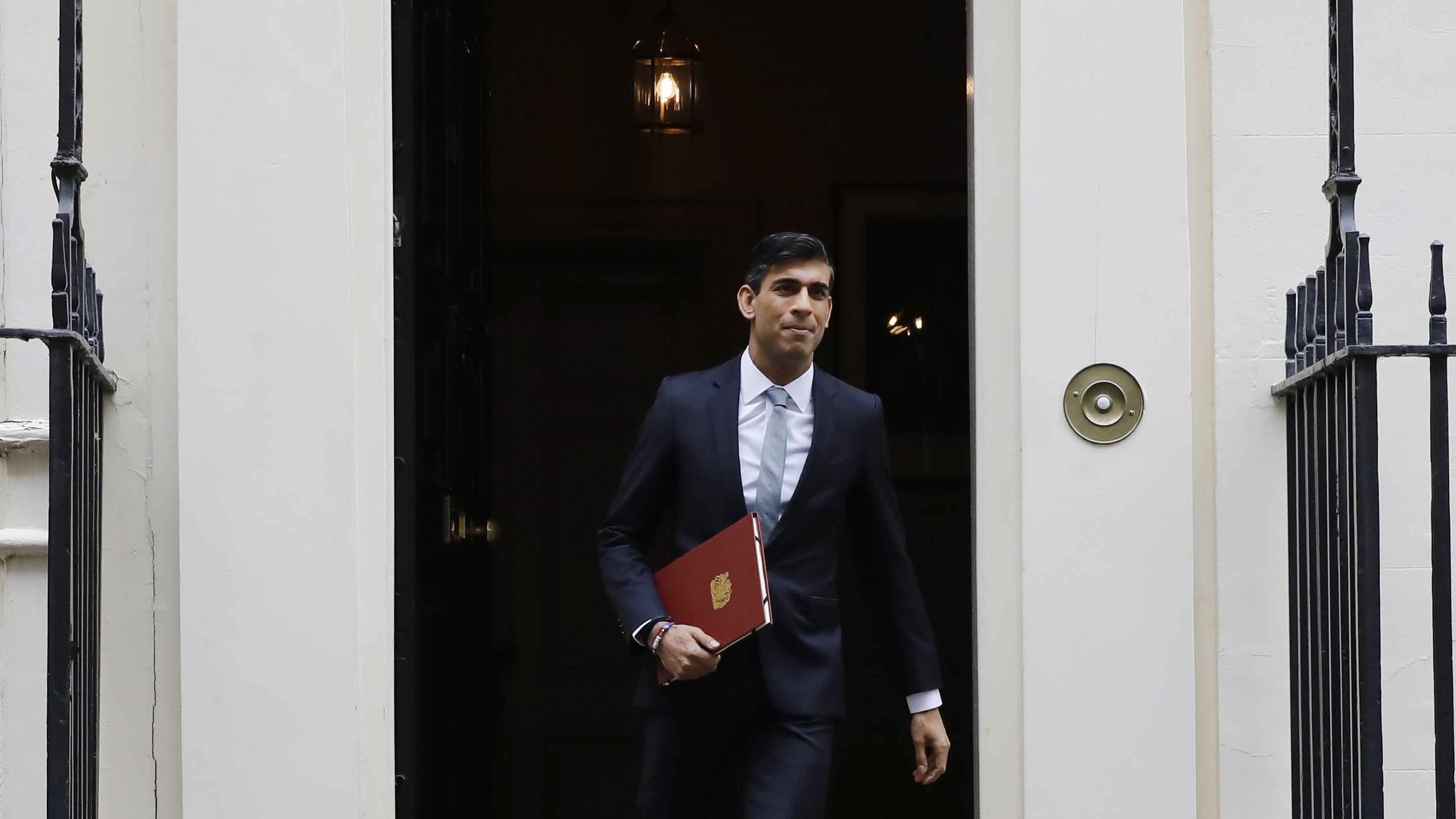Reaction: will Rishi Sunak’s £30bn rescue package stave off summer of discontent?
Chancellor slashes stamp duty and VAT as total bill for coronavirus relief soars above annual health spend

A free daily email with the biggest news stories of the day – and the best features from TheWeek.com
You are now subscribed
Your newsletter sign-up was successful
Rishi Sunak yesterday revealed a £30bn economic aid package that will push the total bill for the government’s coronavirus relief measures to £188.7bn - far more than last year’s entire health spend.
The chancellor’s newly unveiled plan takes the cost of nursing the economy through the pandemic to a total that equates to 9.4% of GDP, The Times reports.
That spend “far exceeds other Whitehall budgets”, including the £140bn paid out for health and social care in the last financial year, the newspaper adds.
The Week
Escape your echo chamber. Get the facts behind the news, plus analysis from multiple perspectives.

Sign up for The Week's Free Newsletters
From our morning news briefing to a weekly Good News Newsletter, get the best of The Week delivered directly to your inbox.
From our morning news briefing to a weekly Good News Newsletter, get the best of The Week delivered directly to your inbox.
The latest key measures announced include:
- • Confirmation that the furlough scheme will end in October
- • Jobs Retention Bonus of £1,000 to be paid to businesses for every furloughed employee kept on as staff until at least January 2021
- • A £2bn “kickstart scheme” to create paid six-month job placements for 16- to 24-year-olds
- • VAT cut from 20% to 5% from 13 July until 12 January 2021 for food and non-alcoholic drinks in restaurants, pubs and cafes
- • An “eat out to help out” scheme offering a 50% discount for every diner, up to £10 per person, from Monday to Wednesday during August
- • Increase in the stamp duty threshold from £125,000 to £500,000 on residential properties sold in England and Northern Ireland between 8 July 2020 and 31 March 2021.
Sunak was “unapologetic” about the spending spree, “warning MPs that more would be needed to address ‘profound economic challenges’ caused by the virus and lockdown”, says The Times.
Conservative MPs applauded the chancellor’s “bold” plan following his mini Budget on Wednesday. According to the Financial Times’ political editor George Parker, “all the talk was about whether they had just been watching the next prime minister”.
But “economic experts, trade unions and Labour questioned whether [Sunak’s] ‘plan for jobs’ had done enough to tackle the looming crisis”, with warnings that the big-spending chancellor will have to “act far more decisively to prevent mass unemployment this autumn”, The Guardian reports.
A free daily email with the biggest news stories of the day – and the best features from TheWeek.com
Unite union general secretary Len McCluskey said that with redundancy notices “already flying around like confetti”, the chancellor needed “to put a stop to this with policies as bold and as necessary as the Jobs Retention Scheme”.
Meanwhile, Garry Young, a deputy director of the National Institute for Economic and Social Research, said that Sunak’s newly unveiled measures “look to be badly timed and could precipitate a rapid increase in unemployment”.
“The incentives offered to employers look too small to be effective,” Young added.
The Organisation for Economic Co-operation and Development, a Paris-based think-tank, warned on Tuesday that the number of unemployed people in Britain could increase to almost 15% of the working population, from the current rate of 3.9%, if the country is hit by a second wave of coronavirus.
With the threat of a fresh surge in infections ever present, Torsten Bell, chief executive of the Resolution Foundation think tank, said that “this economic crisis is likely to be with us until a vaccine is found”. Sunak “should expect to be returning with further measures to support the economy in the autumn”, Bell predicted.
Some Tory MPs have also voiced reservations.
Sunak’s predecessor, Sajid Javid - a fiscal conservative who was ousted from 11 Downing Street by Boris Johnson - called on the chancellor “to ensure that the country was not exposed to sharply rising borrowing costs when interest rates rose”, The Times reports.
Steve Baker, former chair of the European Research Group, noted that the plans were “quite expensive”, and raised concerns about inflation. Fellow Tory MP Edward Leigh argued that “there are no long-term good subsidised jobs”, adding that “sooner or later they are subject to fraud and market distortion” .
This Tory resistance to the big-spending plans may come as no surprise, says the BBC’s political editor Laura Kussenberg, who notes that “many of the measures run against traditional Tory instincts”.
“And there isn’t a whiff of how any of it will be paid for for at least another couple of months,” she adds.
Joe Evans is the world news editor at TheWeek.co.uk. He joined the team in 2019 and held roles including deputy news editor and acting news editor before moving into his current position in early 2021. He is a regular panellist on The Week Unwrapped podcast, discussing politics and foreign affairs.
Before joining The Week, he worked as a freelance journalist covering the UK and Ireland for German newspapers and magazines. A series of features on Brexit and the Irish border got him nominated for the Hostwriter Prize in 2019. Prior to settling down in London, he lived and worked in Cambodia, where he ran communications for a non-governmental organisation and worked as a journalist covering Southeast Asia. He has a master’s degree in journalism from City, University of London, and before that studied English Literature at the University of Manchester.
-
 Antonia Romeo and Whitehall’s women problem
Antonia Romeo and Whitehall’s women problemThe Explainer Before her appointment as cabinet secretary, commentators said hostile briefings and vetting concerns were evidence of ‘sexist, misogynistic culture’ in No. 10
-
 Local elections 2026: where are they and who is expected to win?
Local elections 2026: where are they and who is expected to win?The Explainer Labour is braced for heavy losses and U-turn on postponing some council elections hasn’t helped the party’s prospects
-
 6 of the world’s most accessible destinations
6 of the world’s most accessible destinationsThe Week Recommends Experience all of Berlin, Singapore and Sydney
-
 Local elections 2026: where are they and who is expected to win?
Local elections 2026: where are they and who is expected to win?The Explainer Labour is braced for heavy losses and U-turn on postponing some council elections hasn’t helped the party’s prospects
-
 How corrupt is the UK?
How corrupt is the UK?The Explainer Decline in standards ‘risks becoming a defining feature of our political culture’ as Britain falls to lowest ever score on global index
-
 The high street: Britain’s next political battleground?
The high street: Britain’s next political battleground?In the Spotlight Mass closure of shops and influx of organised crime are fuelling voter anger, and offer an opening for Reform UK
-
 Is a Reform-Tory pact becoming more likely?
Is a Reform-Tory pact becoming more likely?Today’s Big Question Nigel Farage’s party is ahead in the polls but still falls well short of a Commons majority, while Conservatives are still losing MPs to Reform
-
 Can Gen Z uprisings succeed where other protest movements failed?
Can Gen Z uprisings succeed where other protest movements failed?Today's Big Question Apolitical and leaderless, youth-led protests have real power but are vulnerable to the strongman opportunist
-
 Taking the low road: why the SNP is still standing strong
Taking the low road: why the SNP is still standing strongTalking Point Party is on track for a fifth consecutive victory in May’s Holyrood election, despite controversies and plummeting support
-
 What difference will the 'historic' UK-Germany treaty make?
What difference will the 'historic' UK-Germany treaty make?Today's Big Question Europe's two biggest economies sign first treaty since WWII, underscoring 'triangle alliance' with France amid growing Russian threat and US distance
-
 Is the G7 still relevant?
Is the G7 still relevant?Talking Point Donald Trump's early departure cast a shadow over this week's meeting of the world's major democracies